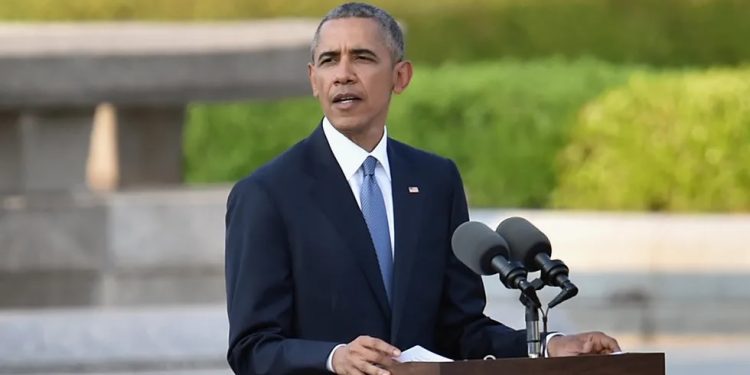If they weren’t outwardly supporting terrorist groups, one might almost pity the anti-Israel protesters braving the cold outside Washington, D.C.’s Anthem music hall. Inside, thousands of liberal elites and one Washington Free Beacon journalist gathered to watch Barack Obama—now a multimillionaire Netflix producer—and Angela Merkel, Germany’s former chancellor, celebrate their contributions to “making the world a better place.”
Obama, still a magnet for giddy adulation from the predominantly white audience of Harry Potter-reading professionals, overpaid bureaucrats, and self-styled cosmopolitans, was ostensibly there to interview Merkel about her memoir, Freedom: Memoirs 1954-2021. Yet, true to form, the former president couldn’t resist making the event about his favorite subject: himself. “Congratulations on finishing the book,” Obama began, before pivoting. “I’ve finished a couple of books. I’ve got one that I haven’t finished, and it’s a terrible feeling. People ask me sometimes, ‘Do you like writing?’ I say, ‘No, I like having written.’” This, of course, was a nod to the yet-to-be-completed second volume of his post-White House memoirs. The first, A Promised Land, spanned a “concise” 768 pages.
Eventually, Obama ceded the spotlight—briefly—allowing Merkel to recount her fascinating life: born in West Germany, raised in East Germany, and rising to power after the Berlin Wall fell. She spoke in German, thrilling the crowd, who donned earpieces to bask in a faux-international ambiance. Her answers, however, were as dry as an instruction manual, while Obama—hardly more engaging—attempted to draw tenuous parallels between Cold War Germany and political divisions in modern America. “Urban and rural communities,” he mused, “have different cultures and values that can be exploited politically.” He suggested that if Germany could reunify after communism, so could America. What he meant was unclear, especially considering the 2024 election results, which showed diminishing geographic divides. Perhaps, he implied, Trump voters were mere political pawns—“bitter rubes” clinging to their grievances.
Merkel advocated curiosity about opposing views. Obama, predictably, used her comment as a segue to talk about himself: “The first big speech I gave to a national audience talked about the United States of America,” he said, before extolling his habit of advising “young leaders” about the importance of “listening actively.” He reflected, unprompted, on his Berlin rally in 2008. “I wasn’t sure anyone would show, but 250,000 people came,” he beamed.
The evening dragged on with predictable back-patting. Obama and Merkel congratulated themselves for saving the global economy in 2008 but avoided reckoning with their roles in shaping today’s populist backlash. On immigration policies, they agreed racism was bad, a banal observation that elicited polite applause.
The monotony was finally interrupted when a protester—presumably a Hamas sympathizer—shouted from the crowd. Obama’s scolding response was swift: “People came to listen to Angela, not you, young lady. Organize your own event.” It was a rare moment of decisiveness in an otherwise stale exchange.
For the audience, who paid handsomely for this exercise in nostalgia, one wonders: are they truly interested in the “insights” of two leaders whose tenure ushered in today’s uncertain world, or is this simply comfort theater for the global elite? Perhaps they, too, deserve a measure of curiosity.
 Telegram is where we really talk. Don't miss out!
Telegram is where we really talk. Don't miss out!







